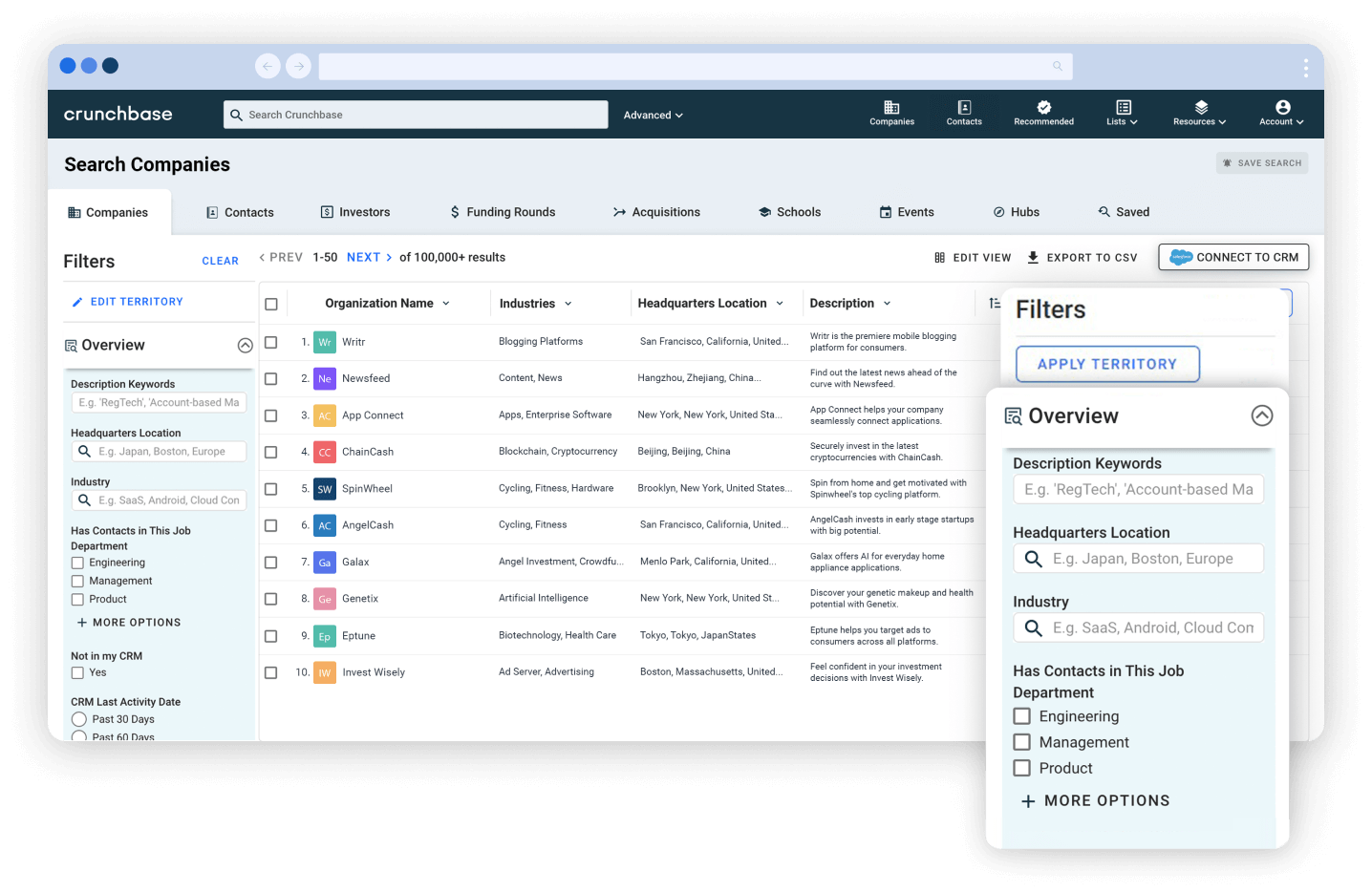Cybersecurity News
From manufacturing to banking and software development to ride hailing — none of it can happen without the proper security in place to protect it from hackers, bad actors and other threats, both internal and external.
Welcome to Crunchbase News’ page dedicated to all things cybersecurity — bringing together cyber news concerning startups, venture capital, funding, new technologies and trends old and new.
Latest Articles

‘There’s A Lot Of Noise’ — VCs Trying To Find Clarity In Cluttered Cyber AI Landscape
SoftBank, Tiger Still Lead Pack Of Spendiest Startup Investors In The World
Last Year Was A Blockbuster For VC-Backed Startups. Here Are Our Top 9 Predictions For What 2022 Has In Store
Cybersecurity Venture Funding Surpasses $20B In 2021, Fourth Quarter Smashes Record
Don’t Expect A Slowdown After Record-Setting Year For Cybersecurity As Several Drivers Remain For Big 2022
Record Number Of VC-Backed Cyber Companies Acquired in 2021, Even As Venture Funding Hits New Highs
30 Startups We Think Could Go Public In 2022
Sysdig Hits $2.5B Valuation As Cloud And Container Security Continues To Bring The Heat
Mergers & Money: Industrial Cybersecurity Investment Makes Comeback As Infrastructure Threats Make Headlines
Identity Verification Company Incode Hits Unicorn Status After $220M Series B
Who Are You? Venture Investment In Identity Management Hits New Levels
Securing The Metaverse—What’s Needed For The Next Chapter Of The Internet
From Cybersecurity To Climate Tech: The Startup Sectors That Will Get Billions From Biden’s Infrastructure Plan
Why Latin America Needs To Build A Cybersecurity Fortress ASAP
Identity Firm Socure Secures $450M Round At $4.5B Valuation
Why Startup Investors Are Putting More Money Into Insurtech
VC Funding For Cybersecurity Companies In Israel On Pace To Nearly Double This Year
Devo Whips Up $250M Series E At $1.5B Valuation
Tiger Global And SoftBank Vision Fund Vie For Top Slot As Q3’s Biggest Startup Investor
No Real Slowdown: Funding For Cybersecurity Tops $14B For Year
VCs Continue To Flock To Cyber Insurance As Coalition’s Valuation Doubles In 6 Months
Venture Investment In Cryptosecurity Jumps 10x Over Last Year As Sector Hits Sweet Spot With Venture Capitalists
Mergers & Money: VC-Backed Cyber Companies Bought Up At Record Pace
Cybereason Lands $275M From Mnuchin’s New Firm And Others
Virsec Lands $100M As Cyberattacks Ramp Up
Frequently Asked Questions
What is cybersecurity?
Cybersecurity refers to the practice of protecting computers, networks and data from unauthorized access, damage or theft. It involves keeping private and sensitive information — everything from passwords to consumers’ personal information, to private company financial details and intellectual property — safe from hackers, bots, viruses and other threats.
Overall, cybersecurity practices aim to create a secure digital environment by proactively identifying and addressing vulnerabilities, monitoring for potential threats, and responding swiftly to mitigate risks.
What are some specific cybersecurity tools and strategies?
Cybersecurity approaches constantly evolve to respond to new types of threats, but broadly include:
- Network security: Implementing firewalls, intrusion detection systems (IDS), and other mechanisms to protect networks from unauthorized access and malicious activities.
- Application security: Ensuring that software applications are designed, developed and maintained with security in mind to prevent vulnerabilities that could be exploited.
- Data protection: Encrypting sensitive data, establishing access controls, and implementing secure backup and recovery procedures to safeguard information.
- Identity and access management: Employing authentication and authorization mechanisms to verify users’ identities and control their access to systems and data.
- Incident response: Developing plans and processes to detect, respond to and recover from security incidents effectively to minimize potential damages.
- Security awareness and training: Educating users about best practices, potential risks, and how to recognize and respond to security threats.
- Vulnerability management: Regularly scanning systems for vulnerabilities, applying security patches, and keeping software and hardware up to date.
- Security auditing and compliance: Conducting regular audits and assessments to evaluate the effectiveness of security controls and ensure compliance with relevant regulations and standards.
What are the biggest cybersecurity companies?
The largest companies that offer cybersecurity services include, among others:
- Palo Alto Networks — specializes in network security and offers firewall and intrusion prevention systems.
- Fortinet — known for network security appliances and provides firewall, VPN, antivirus, intrusion prevention and endpoint security services.
- CrowdStrike — a company known for its endpoint protection platform, which includes antivirus, threat intelligence and incident response technology.
- CloudFlare — with technology that aims to help websites load faster and stay safe from online threats through services such as DDoS protection, web application firewalls and SSL/TLS encryption.
- Cisco Systems — offers network security, cloud security and endpoint protection technologies.
- Zscaler — provides cloud-based security services including secure web gateways, firewall as a service and data loss prevention.
- McAfee — offers a suite of cybersecurity services including antivirus software, network security, data protection and threat intelligence.
- Okta — operates an identity and access management platform that helps organizations manage and control user authentication, authorization and access to applications.
- Check Point Software Technologies — offers cybersecurity products including firewalls, network security appliances, endpoint security and threat intelligence services.
- Trend Micro — specializes in endpoint security, cloud security and network defense services.
What are examples of cybersecurity unicorn startups?
Cybersecurity companies on The Crunchbase Unicorn Board as of mid-2023 include:
- Wiz — offers an automated cloud security platform to help businesses identify and remediate security vulnerabilities and misconfigurations within their cloud infrastructure.
- Tanium — provider of endpoint security and management services for organizations.
- Lacework — specializes in automated threat detection, compliance monitoring and anomaly detection for cloud computing environments.
- Fireblocks — offers a digital asset custody and transfer platform designed to help organizations safeguard and manage digital assets including cryptocurrencies.
- Netskope — makes tools to monitor and safeguard against threats to cloud services, applications and data.
- Snyke — a platform that helps software developers identify and fix vulnerabilities in open-source code and containers.
- 1Password — provides a password manager and digital vault for consumers and businesses to securely store, generate and manage their passwords and other sensitive information.
- OneTrust — a privacy management platform for organizations to manage and demonstrate compliance with data privacy regulations, conduct assessments and implement data governance practices.
- Coalition — provides risk management, insurance and incident response services for businesses to protect against cyber threats and recover from cyber incidents.
- SonarSource — provides tools for code analysis and inspection to help software developers spot and fix vulnerabilities in computing code.
What are the biggest cybersecurity trends?
The biggest cybersecurity trends in 2022 and 2023 include technologies focused on identity and authentication, data and privacy, governance, network security, and innovations around securing financial services and cryptocurrencies.
Expect more emphasis to be placed on security’s role in protecting data and proprietary information used in AI modeling.
How much venture funding has gone to cybersecurity?
Venture capital in cybersecurity hit a record high in 2021 — like it did in many industries — but last year saw it come back down to Earth. Funding to cybersecurity startups dropped by a third in 2022, according to Crunchbase data.
While 2021 saw a record $22.8 billion roll into startups in the cybersecurity sector, that number fell to $15.3 billion last year. Still, the 2022 venture total represents a 68% increase from 2020 — which until 2021 was the high-water mark for venture funding in the industry.
What is the state of the cybersecurity jobs market?
The cybersecurity jobs market is robust. As cyber threats have proliferated, so have jobs in the cybersecurity industry.
In the private sector, that includes roles at cybersecurity startups and public companies; governments around the world have also staffed up their cyber defense units to combat cyber crime and national security threats.
The U.S. Bureau of Labor Statistics projects that the job market for information security analysts will grow 35% between 2021 and 2031, with about 19,500 new job openings in the sector added each year — a much faster growth rate than the overall job market. Information security analysts in the U.S. earn on average $102,600 per year, according to the BLS.
Where can I read cybersecurity industry news?
All of Crunchbase News’ cybersecurity articles are added to this page as we report them.







